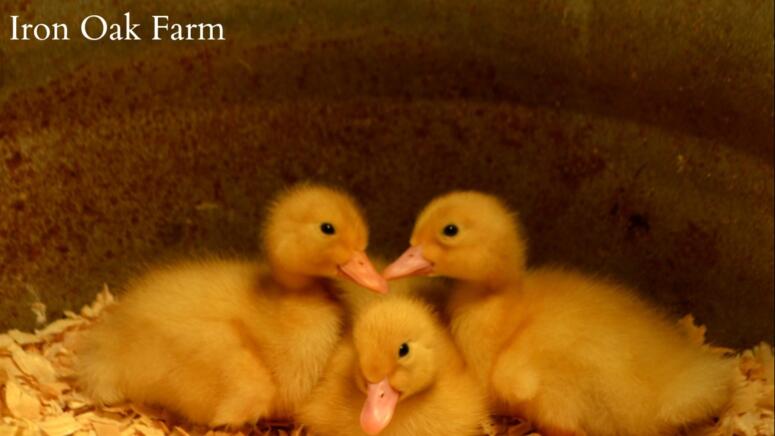
Posted by Jennifer Sartell, Professional Homesteader & Blogger, Fri, Aug 31, 2018; updated Wed, May 3, 2023
There are few things in this world cuter than baby ducklings. Over the years I’ve raised many breeds of duck, and as a whole they are a pleasure to have on the homestead.
Ducks are gentle birds, which makes them great for children to raise. You don’t have to worry about fingers getting pecked or crazy roosters rearing up after your little ones. When you hand-feed a duck, it scoops up the food with its smooth bill ever so sweetly.
Ducks will also imprint on people. Imprinting is when a bird assumes you are their mother. They will follow you everywhere and remain loyal for life if interaction is continued.
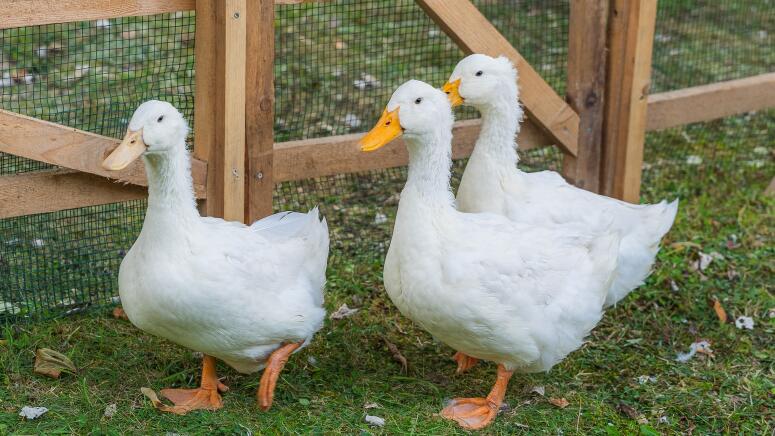
Social Personalities and Male/Female Balance
Tarp or Empty Feed Sacks.
These are definitely handy to have on hand. They create an instantly clean, dry surface. Sometimes we put them under the doe to collect the placenta or as a place to put a kid that needs to be cleaned. Sometimes we sit on them in the stall if we have to wait and watch a doe. They’re just nice to have around.
Surgical Gloves.
If the doe is having problems or a kid needs to be turned or pulled, the use of surgical gloves keeps things sanitary for both you and the goat. Personal Lubricant. This can be used with the surgical gloves to make internal inspection more comfortable for the goat.
Paper Towels.
Believe me, you’ll be thankful you have them handy!
Bucket of Warm Soapy Water.
It’s nice to be able to clean yourself up a bit if you have to assist in multiple births.
Old, Clean Bath Towels.
Let mom do most of the cleaning. This is an important time for her to bond with her new kid. But if she is in active labor with a second kid and the first one is still wet and cold, us humans can help mom by drying off the baby goat.
Hair Dryer.
Some of our goat kids have been rejected by their mothers, so to dry them properly—especially in colder spring weather—a hair dryer set on low can help dry damp babies completely.
Instant-Read Digital Thermometer.
It’s good to have, especially if the goat kid is born in cold weather. You can make sure the temperature is staying where it should be. A goat’s temperature should be between 102.5°–103.5° Fahrenheit.
Dental Floss.
We use floss to tie umbilical cords, which limits exposure to bacteria.
Scissors.
To cut lengthy umbilical cords, dental floss, etc. Handy to have.
Iodine.
To dip umbilical cords after tying.
Dixie Cup.
We tear the top off a Dixie cup to make a shallow dish in which to dip the umbilical cord. It’s disposable, and we usually have them on hand for dipping our milk goat’s teats. You can also use a clean lid or any shallow dish.
Selenium Gel.
Our area is very deficient in selenium, so we always give our newborn kids a selenium supplement. Selenium can mean life or death for a newborn goat. Check with your county extension and consult your veterinarian to determine whether your goats will need a selenium supplement, as well as the correct dosage.
Probiotics.
We also give our newborns a dose of probiotic gel designed for baby goats. This helps to increase their appetite and get the rumen going.
Bottle Nipples.
If you find that you have to bottle-feed your goat kids, it’s nice to have the nipples ready to go. You can find these at local feed stores.
Several Clean Empty Soda Bottles.
We use clean 20 oz soda bottles to feed our goat babies. I take the labels off and mark ounce increments on the sides of the bottles.
Kid Colostrum.
It’s always best if you can milk the dam and feed it to the babies, but sometimes this isn’t possible. Having Manna Pro® Kid Colostrum, which is specifically formulated for baby goats, on hand is a must. Kid Colostrum is a rich source of essential amino acids for a fast start in life. Bottle brush. To clean the bottles between uses.
Electrolytes.
These are important for the mother. We recommend Manna Pro Goat Electrolyte, a supplement that helps keep goats healthy during times of stress.
Molasses.
We make a bucket of warm molasses water for mom to drink after labor.
Milking Supplies.
Be prepared to go into milking mode at birth. Even if you aren’t planning to milk your goats for some time, nature has a way of changing our expectations. There are times when the doe won’t let the kids nurse, or the kids are too weak to nurse. In either of these instances, milking must take place.
There are many different ways to milk goats. Each farm seems to have its own routine and practice when it comes to sanitation, teat dipping, etc. It’s important to research and decide which method you are most comfortable with. We recommend having these supplies on hand:
Washcloth, Soap and Pail to Wash Udders.
We use castile soap to wash our goats’ udders. Don’t worry about keeping things extremely sterile for the kid, but keep in mind that you also don’t want bacteria to get into the mother’s teat. Kid saliva has some antibacterial properties that help keep bacteria out of the mother’s teat in between feedings while the wax cap is forming; the soapy water takes the place of this.
Strip Cup.
To check for mastitis or abnormalities.
Milk Pail.
To collect milk.
Iodine.
To dip teats in after milking.
If this is your first time preparing for the birth of a goat, be calm and trust in both yourself and your doe. Having useful items within reach is not only convenient, but will help to take additional stress off the situation. Birth in the farmyard is always a joyful time.
Be sure to check back often for future posts on birthing and raising kids.
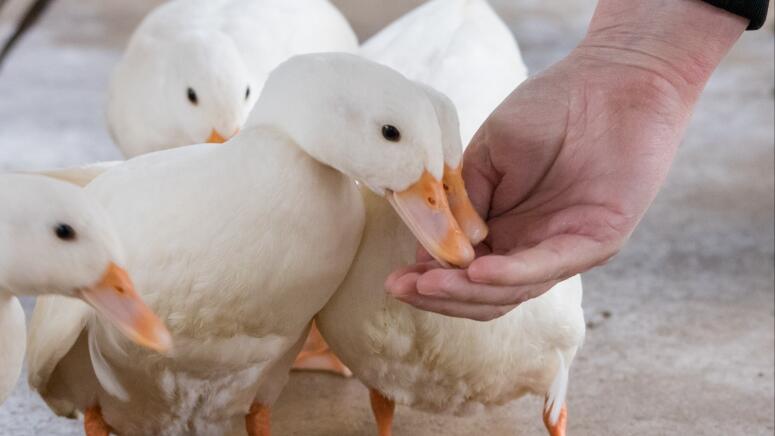
What to Feed Ducks
Ducks can be fed an all-around flock raiser, and they also do well on chicken layer.
Some breeds, such as Pekins, tend to become overweight easily, so it’s best to feed them a specified amount twice a day like a dog.
Ducklings should not be fed a medicated feed meant for chicks.
As far as treats for ducks, you have many options, from store-bought treats like Manna Pro Duck Discs to leftover fruits and vegetables from your own kitchen. Check out the best fruits and veggies to feed ducks below!

How Much Water do Ducks Need?
Ah, water and ducks. The big difference between raising chickens and ducks is the amount of water that ducks require to be happy and healthy.
Ducks can be raised without a body of water, but they will be MUCH happier and cleaner/healthier if you give them something to splash around in. At the very minimum they will need a kiddie pool. Make sure that the ducks are able to step in and out of the pool easily. You may have to stack some patio stones depending on the size.
The pool will need to be emptied once a day to keep it clean and keep odors away. So, factor in several gallons of water being poured into your yard area when designing the coop/run.
If you plan to introduce your ducks to a natural body of water, caution should be taken to not overpopulate the area. Duck droppings can disrupt the bacteria balance in stagnant water especially. If you have any questions, contact your local county extension.
Depending on how your coop is designed, ducks may also need a waterer along with the pool. Ducks need water in order to swallow their food, so a water source should be located in close proximity to the feeder. The waterer must be designed so that the ducks can submerge their nostrils. They must also be able to scoop the water with their bill. Drip systems are not the best for ducks.
Check out Flock Party duck feeders and drinkers which are specifically designed for flat duck and geese bills.
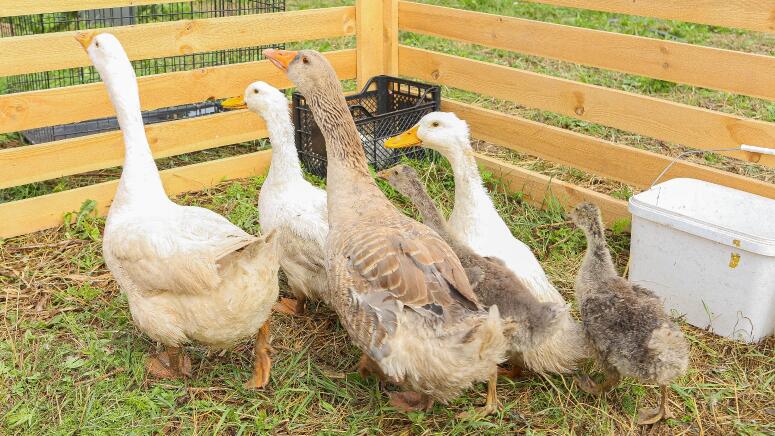
Keeping a Duck Pen Clean
I’m not going to lie… ducks are messy! EVERYTHING gets wet. It’s just the nature of ducks. They will track water to and from the water pan to the feed pan until you can’t tell the difference. When designing your duck coop, linoleum works well in making the floor water resistant.
We also use a pelleted compressed pine bedding meant for horse stalls. It expands when wet and is super absorbent. Allow for drainage and be willing to clean and refresh bedding often.
Duck Eggs and Nesting Boxes
Most duck breeds are ground layers. They will appreciate a covered, floor-level nesting box in which to lay their eggs. Bedding should be replaced often, as ducks have wet feet and tend to soil their eggs quickly.
What Supplies Do I Need for Pet Ducks?
Ducks have little defense against attacks by predators. They are slow, most farm breeds can’t fly, and their bodies lack the talons and sharp beak that chickens have. So, a coop must be secure.
If you plan to free-range your ducks, think about adding a couple of geese to your flock. Our geese protected our ducks wonderfully! And they get along very well.
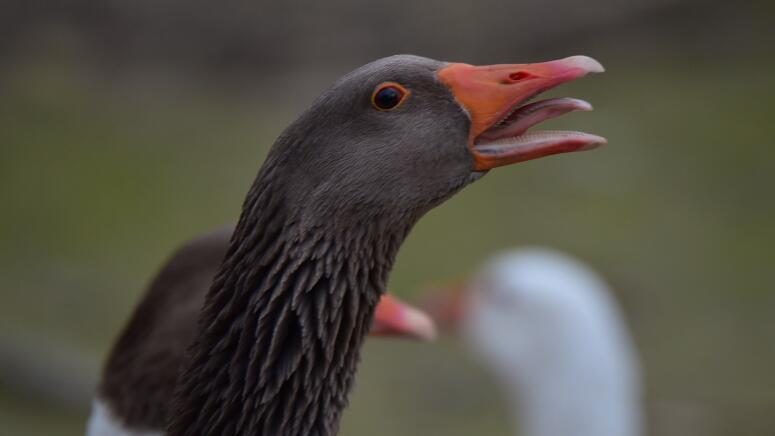
Ducks Must Be Trained to Come Home at Night
Unlike chickens, ducks can see in the dark. So, they will not have that same homing instinct that your chickens might have to return to the coop each night. When I first raised ducks, their instinct was to sleep in our pond. Every night it was a struggle to try and get the ducks out of the water and into their coop.
At a very early age, teach them to come in at night for their dinner. Ducks are smart, and will come when called if they know they will get food. Again, that’s why it’s best to feed them twice a day rather than offer free-choice feeding.
A great product to help protect your ducks and geese from predators at night is the Manna Pro Harris Farms Automated Coop Door. Click here to learn more!
Are Ducks Good Pets?
We hope that after reading this article you see what amazing pets ducks and geese can make, and are thinking about adding some to your own backyard. Let Manna Pro be your resource and guide! Check out our duck products below and don't hesitate to contact us if you have any questions about keeping ducks and geese as pets.
Author Profile: Jennifer Sartell
Jennifer Sartell is the primary caretaker of all animals on her and her husband’s farm in Fenton, MI. With a passion for living a simple life, Jennifer enjoys creating art, taking in nature, raising animals and has developed a deep appreciation for homesteading.
Jennifer and her husband, Zach, currently raise goats and poultry. Her vast amount of experience on the farm includes, but is not limited to: milking, shearing, hoof trimming, vaccine administration, assisting in animal births, dehorning, egg collecting, chick and turkey hatching, feeding, watering, etc.
She can also cook a mean farm-to-table meal and when the day is done has documented and photographed their day on the farm.
Feature Products

